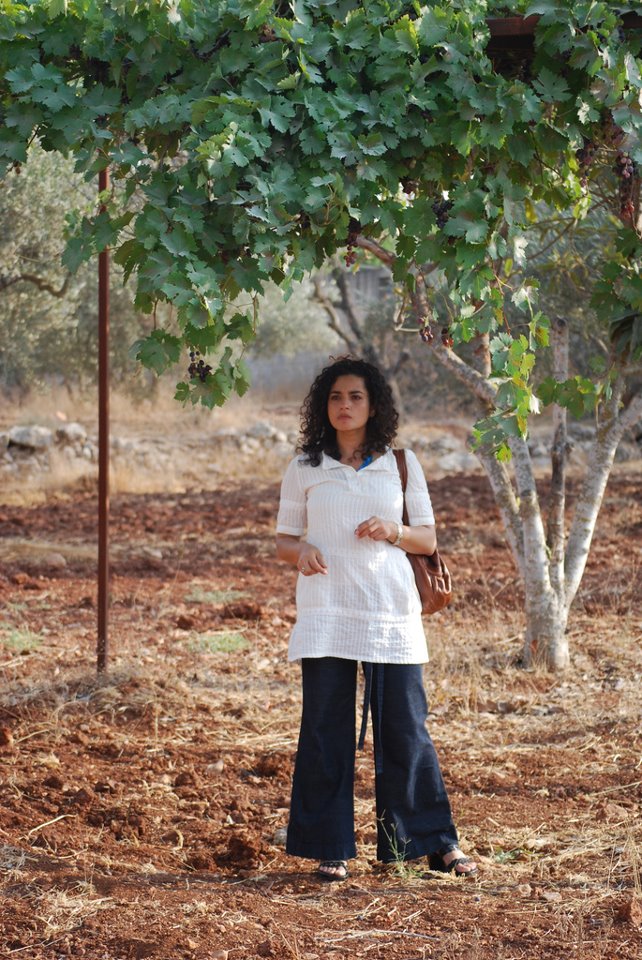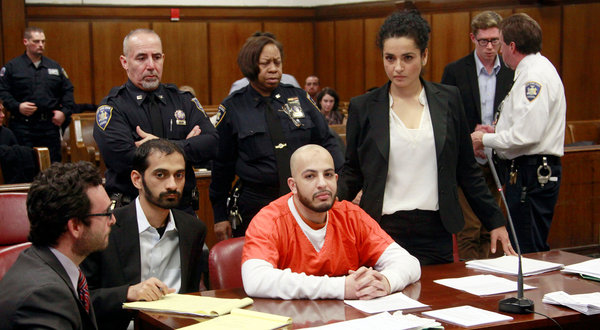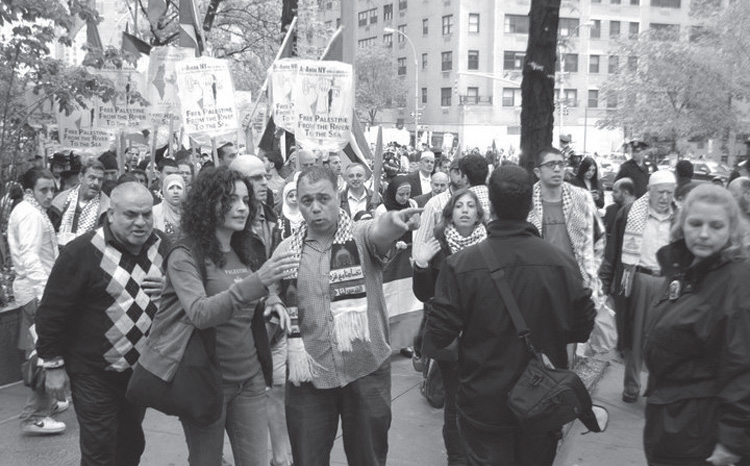Lamis Deek, Al-Awda co-founder and longtime activist, was honored by the National Lawyers Guild – NYC chapter at its annual Spring Fling benefit, which every year honors accomplished and ground-breaking legal work in service of the people. The event took place this year on June 14, 2013, and honored Lamis Deek, Lennox Hinds, Abdeen Jabara, Jeanne Mirer, Robert Van Lierop and law student Jean Stevens. The following article appeared in the Spring Fling journal, saluting Lamis’ legal and activist work in service of people’s movements and the liberation of Palestine:
LAMIS DEEK: Fierce Movement Lawyer
by Michael Letwin, Charlotte Kates, Fahd Ahmad

Lamis Deek in Palestine near her childhood home, watching the occupation. 2008.
We came to meet Lamis Deek when she was a law student. Now almost ten years into legal practice, Lamis remains a people’s lawyer — connected to the communities and the movements she defends. We have been proud to struggle alongside her whether on the streets, in the community, or in the courts.
From fighting surveillance and predatory prosecutions, to protecting religious freedoms and the right to protest, to exposing repression abroad, Lamis’ deep commitment to justice and clarity of vision have been a great source of strength to besieged communities. Lamis has led the way in formulating a comprehensive understanding of attacks on Arab, Palestinian and Muslim communities, and continually develops forceful defense strategies. Her extraordinary synthesis of legal work, political analysis, and activism have inspired numerous lawyers, legal workers, and grassroots activists.
Bill Doares, a lifelong activist, says, “Lamis plunged into the often thankless fight to defend the innocents victimized by the ‘war on terror.’ For nearly a decade I have watched her in the ‘halls of justice,’ defending the poor and powerless against the cruel machine of state repression, abetted by a lying media. I have seen her comfort the families of the accused while fighting merciless state agents. And amazingly, in spite of all those odds, she has often prevailed. This same passion also makes her an effective organizer.”
Her commitment came from a life of struggle which she challenged through political analysis, grassroots activism and legal advocacy. A proud daughter of Palestine, Lamis was born near Nablus, a renowned center of anti-colonial resistance. Like other Palestinian children, confronting armed Zionist settlers and soldiers who occupied her nation since 1948, she learned the importance of community and courage in the fight against injustice. In the US, her family remained deeply connected to the homeland. Lamis’ father, Jamal Deek, an educator, organizer, farmer and father of twelve — persecuted by Israeli Occupation Forces for teaching — remained the elder of their community. As a young Palestinian exile, facing racism and poverty, she related her experiences to others’, realizing that all oppression stemmed from systems which sought to maintain artificial elitist constructs — that poverty, racism and imperialism stemmed from the same malcontents. This organic political development would lead her to forge principled alliances between Arab, Black, Latino and Asian struggles, and inspired her to use the law as a mechanism of resistance and a tool for radical and structural change.
During law school, Lamis joined the global ferment among Palestinian communities leading up to the 2000 Intifada against the Zionist oppression in Palestine. From the refugee camps in Lebanon to cities across the world, a global movement for Palestinian return and liberation emerged. In New York Lamis, as part of Al-Awda, was at the center of the Arab- Palestinian movement: flyering, organizing youth and elders, convening countless events, organizing rallies, speaking with a powerful voice from the platform, and building alliances with organizations like Malcolm X Grassroots Movement, Puerto Rican independentistas, CAAAV, Nodutdol, Desis Rising Up and Moving, BAYAN, Gabriela, and countless others. All while she studied full-time, worked part-time, founded the Brooklyn Law School Muslim Law Students Association, and withstood attacks from law students and faculty.
Her work would reach new heights in the aftermath of 9-11, which had a devastating impact on this burgeoning movement and the community that built it. Special registration, roundups, mass surveillance, arrests, dubious immigration and “terror” charges destroyed lives and gutted Arab communities in the U.S. — and shaped Lamis’ legal career. In her early years of practice, prior to the formation of defensive legal committees, the community came to depend on Lamis’ work to stave off government attempts to disempower Arab-Muslim New Yorkers. While groups felt compelled to host events for government agents, Lamis was called to counter the government narrative at those same events and to empower the community to ward off government infiltration — to say what many were too afraid to say.

With Ahmed Ferhani, 2013.
Alongside comrades in social justice movements across New York, she engaged in legal triage for Arab and Muslim migrants. By 2005, she opened her office in Bay Ridge so as to provide trustworthy and accessible legal services while organizing that same community to defend itself.
It says everything about Lamis’ legal and political practice that she co-led rallies, co-organized security marshals, engaged NLG legal observers for those rallies, helped ward off NYPD attacks, and then defended victims of NYPD brutality and false arrest for having attended those rallies — from the “Palestine Nine” to the defense of Michael Williams, she inspiringly refused to divorce the legal struggle from the political one.
Within one year of her admission, Lamis became co-counsel to Sheikh Moayad, an ill elder abducted from Yemen and charged with “material support” through false evidence and Israeli witnesses unrelated to the case. Lamis, though a young attorney, was sought because the clients believed she would deconstruct and challenge the political underpinnings of the case, stave off attempts to manipulate the jury, and provide a zealous defense that challenged not only the government, but her co-counsel as well. Although the convictions were finally overturned and Lamis accompanied Moayad on his triumphant return to Yemen — not leaving until her client’s safety and health was secured — this case would shape her work for years to come, and would give Lamis her own experiences of government harassment.
Throughout the trial and thereafter, the government sought to scare Lamis into retreat: from claiming she posed a security risk, to harassment in and outside of court, to proxy threats and even by making grossly false accusations against Lamis hoping to shake her commitment to secure the release of the Sheikh. Yet, she did not retreat. From that time on, Lamis’ legal work would defend against the myriad manifestations of racism and attacks against her — governmental and civil — which she’d come to leverage for her clients’ benefit.
Lamis would also come to represent hundreds of community leaders against militant government surveillance, abusive investigations and false charges. Consequently, in 2011 she played a pivotal role in helping media outlets further expose the NYPD “demographics unit,” established with help from the Israeli government for the wholesale surveillance of Muslim communities, many of whom had been her clients. At the same time she helped Muslim leaders devise a comprehensive plan to fight against the unlawful unit and convene a working group.
This was only a few months into Lamis’ representation of Ahmed Ferhani, targeted in an NYPD “sting operation” which lured marginalized men into manufactured plots of conspiracy to commit terrorism. This operation was particularly extraordinary — the undercover officer who targeted Ferhani had previously posed as a member of Al-Awda. Lamis and Al-Awda had been targets, and before the investigation led to an arrest, the undercover attempted to conflict Lamis off the case, causing her to unknowingly represent him in a staged altercation with another officer — an effort that failed. Despite this, Ferhani requested Lamis represent him and she did. In People v. Ferhani, Lamis’ penetrating investigation of the undercover officer, his bungled prior investigations, her persistent demands for discovery and challenges to prosecutorial misconduct — including attempts to intimidate and breach the defense camp — exposed significant weaknesses in the prosecution’s case and chipped away decades from the plea bargain.
In the Rye Park Playland case, a community holiday celebration turned into terror as a group of Arab boys and men were brutalized, arrested and charged after being attacked by the local police department. Through the gathering of testimonies, videos, and other evidence, Lamis demonstrated that the arrests were the result of police violence and demonization, successfully resolving the charges.

At a Palestinian rally, New York, 2012.
The practice of overcharging defendants, a growing tactic of the legal system, is combined with demonization in cases involving Muslims. In 2011 a group of Muslim teenage girls were attacked by a racist. When Michael Williams intervened to defend them, he was physically attacked and charged with first-degree assault, among many other counts. At trial, the prosecution demonized not only Mr. Williams, but the teenage girls, claiming they were motivated to lie by “terrorist” sympathies and by their religion. Lamis built a defense that exposed the prosecution’s gross misconduct, and secured the most favorable disposition under the circumstances.
It was thus that she founded the NLG’s Muslim Defense Project, which was built from her legal and organizing experience and grew through her service to community groups which would later support and engage the MDP.
Lamis also played a key role in defending the rights of Muslim communities to establish houses of worship. In Bay People v. MAS, et al, Lamis defended the Muslim community from attempts to halt the construction of a local mosque, by defeating the empty claims and countersuing the right-wing racist formation, before the Court, the Board, and on appeal. The success was due not only to Lamis’ legal acumen, but also her role in empowering the community to mobilize in its own defense.
While organizing and defending New Yorkers, Lamis did not take her eye off the victims of the wars abroad, especially the war for imperialist expansion in the Arab world. She led a lawyer’s delegation to Palestine in 2007 for political prisoners in conjunction with Addameer, a Palestinian political prisoner advocacy organization. The delegation observed an Israeli military trial of Palestinian leader and Legislative Council member Ahmad Sa’adat — and the arbitrary use of dubious “evidence,” coerced testimony, and a militarized kangaroo court. She co-launched the U.S. “Viva Palestina” Convoy to Gaza in 2009, and responded to a call in 2010 from the survivors of the Mavi Marmara by devising the legal and organizing strategy they would follow in seeking justice for those murdered by Israeli Occupation Forces’ attacks on the convoy. At the beginning of the revolution in Egypt, she responded to calls for the release of political prisoners, mobilizing an emergency network which helped secure the prisoners’ release, and joined the NLG’s 2012 delegation to investigate U.S. crimes in Egypt.
Lamis continues to serve the people and expand the Guild. She is now leading efforts to convene a Legal Committee for U.S. Accountability in Egypt and Palestine, and is working to convene an NLG-NYC committee of lawyers and legal workers who are embedded in grassroots social justice movements.
Lamis Deek is a true lawyer-activist in the best tradition of Arthur Kinoy, Ann Fagan Ginger, and her fellow co-honorees tonight. Her work has crossed borders and defied the most brazen government attacks to defend those in greatest need. She is an inspiration to all who advocate for justice.
![Lamis Deek of Al-Awda honored for legal accomplishments by National Lawyers Guild NYC Lamis Deek, Al-Awda co-founder and longtime activist, was honored by the National Lawyers Guild – NYC chapter at its annual Spring Fling benefit, which every year honors accomplished and ground-breaking […]](https://al-awdany.org/wp-content/uploads/2013/06/lamis-rally-620x300.jpg)

